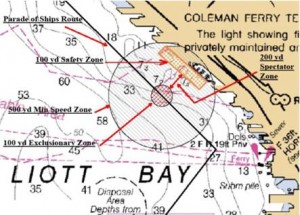The Peace Fleet is an incarnation of earlier demonstrations: the People’s Blockade of U.S. Navy vessels carrying munitions during the Vietnam War; and the Peace Blockade in Hood Canal, demonstrating against the arrival of the first Trident submarine, the USS Ohio, at the Trident submarine base at Bangor in 1982.
The Peace Fleet began on August 2, 2000 when the Trident submarine, USS Alabama, arrived in downtown Seattle for Seafair, complete with up to 192 nuclear warheads.
In 2011, Seafair and the Navy turned viewing area on the rooftop of Pier 66 into a private event. This is the location where in previous years the public had been invited to view the Parade of Ships. In past years there were as many demonstrators with signs and Raging Grannies with songs as any other group on the rooftop.
2012 was the first year for the Coast Guard’s permanent rule for its no-protest zone, or so-called “safety zone,” in Elliott Bay. The Coast Guard agreed with the ACLU that Peace Fleet boats should be able to remain in the area between the Coast Guard’s 100-yard exclusionary zone from Navy vessels and the safety zone which extends 100 yards from Pier 66. See below the Coast Guard map for Pier 66 for 2014 showing the Seafair Parade of Ships route along the waterfront.
 In 2013, the US Navy did not attend Seafair due to military budget cuts in FY 2013 resulting from the Budget Control Act of 2011, also known as sequestration. The Department of Defense decided in 2013 to halt participation in community relations or outreach events that come at additional cost to the federal government. In April 2013, a spokesperson for the Navy’s 3rd Fleet said that the round-trip bill for fuel alone for three warships from San Diego to attend the Seattle Seafair festival in 2012 cost $1.1 million.
In 2013, the US Navy did not attend Seafair due to military budget cuts in FY 2013 resulting from the Budget Control Act of 2011, also known as sequestration. The Department of Defense decided in 2013 to halt participation in community relations or outreach events that come at additional cost to the federal government. In April 2013, a spokesperson for the Navy’s 3rd Fleet said that the round-trip bill for fuel alone for three warships from San Diego to attend the Seattle Seafair festival in 2012 cost $1.1 million.
On June 11, 2015, on a vote of 278-149, the House of Representatives passed a $578.6 billion defense budget for FY 2016. Of the 10 Washington State representatives, DelBene, Larsen, McDermott, and Smith voted against the defense bill.
On June 18, 2015, on a vote of 71-25, the Senate passed a $612 billion defense budget for FY 2016. Both Senators Murray and Cantwell voted for the defense bill.
The top Democrats on both Armed Services Committees — Sen. Jack Reed and Rep. Adam Smith — both voted against the NDAA. At issue was not any difference on defense policy but a fundamental question of funding. Republicans bypassed the Budget Control Act spending caps (the so-called sequester) by placing nearly $90 billion into the Overseas Contingency Operations (OCO) account, designating routine spending as an emergency war expenses exempted from the caps. (Breaking Defense, June 18, 2015)
The Peace Fleet this year, as in past years, will require no public funds or public resources.
